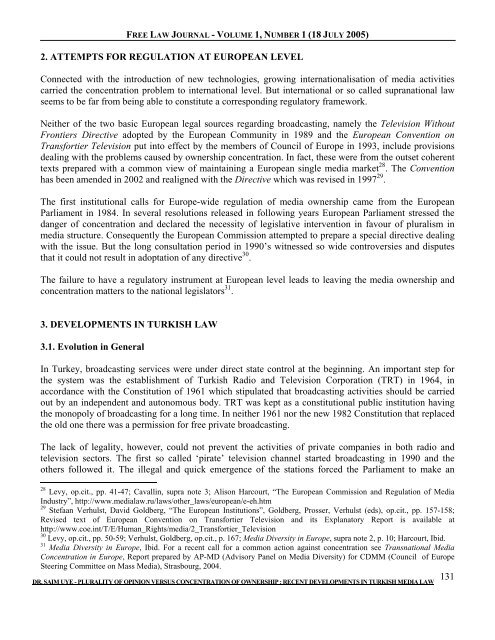Free_Law_Journal-Vol.. - Free World Publishing Inc.
Free_Law_Journal-Vol.. - Free World Publishing Inc.
Free_Law_Journal-Vol.. - Free World Publishing Inc.
You also want an ePaper? Increase the reach of your titles
YUMPU automatically turns print PDFs into web optimized ePapers that Google loves.
FREE LAW JOURNAL - VOLUME 1, NUMBER 1 (18 JULY 2005)<br />
2. ATTEMPTS FOR REGULATION AT EUROPEAN LEVEL<br />
Connected with the introduction of new technologies, growing internationalisation of media activities<br />
carried the concentration problem to international level. But international or so called supranational law<br />
seems to be far from being able to constitute a corresponding regulatory framework.<br />
Neither of the two basic European legal sources regarding broadcasting, namely the Television Without<br />
Frontiers Directive adopted by the European Community in 1989 and the European Convention on<br />
Transfortier Television put into effect by the members of Council of Europe in 1993, include provisions<br />
dealing with the problems caused by ownership concentration. In fact, these were from the outset coherent<br />
texts prepared with a common view of maintaining a European single media market 28 . The Convention<br />
has been amended in 2002 and realigned with the Directive which was revised in 1997 29 .<br />
The first institutional calls for Europe-wide regulation of media ownership came from the European<br />
Parliament in 1984. In several resolutions released in following years European Parliament stressed the<br />
danger of concentration and declared the necessity of legislative intervention in favour of pluralism in<br />
media structure. Consequently the European Commission attempted to prepare a special directive dealing<br />
with the issue. But the long consultation period in 1990’s witnessed so wide controversies and disputes<br />
that it could not result in adoptation of any directive 30 .<br />
The failure to have a regulatory instrument at European level leads to leaving the media ownership and<br />
concentration matters to the national legislators 31 .<br />
3. DEVELOPMENTS IN TURKISH LAW<br />
3.1. Evolution in General<br />
In Turkey, broadcasting services were under direct state control at the beginning. An important step for<br />
the system was the establishment of Turkish Radio and Television Corporation (TRT) in 1964, in<br />
accordance with the Constitution of 1961 which stipulated that broadcasting activities should be carried<br />
out by an independent and autonomous body. TRT was kept as a constitutional public institution having<br />
the monopoly of broadcasting for a long time. In neither 1961 nor the new 1982 Constitution that replaced<br />
the old one there was a permission for free private broadcasting.<br />
The lack of legality, however, could not prevent the activities of private companies in both radio and<br />
television sectors. The first so called ‘pirate’ television channel started broadcasting in 1990 and the<br />
others followed it. The illegal and quick emergence of the stations forced the Parliament to make an<br />
28 Levy, op.cit., pp. 41-47; Cavallin, supra note 3; Alison Harcourt, “The European Commission and Regulation of Media<br />
Industry”, http://www.medialaw.ru/laws/other_laws/european/e-eh.htm<br />
29 Stefaan Verhulst, David Goldberg, “The European Institutions”, Goldberg, Prosser, Verhulst (eds), op.cit., pp. 157-158;<br />
Revised text of European Convention on Transfortier Television and its Explanatory Report is available at<br />
http://www.coe.int/T/E/Human_Rights/media/2_Transfortier_Television<br />
30 Levy, op.cit., pp. 50-59; Verhulst, Goldberg, op.cit., p. 167; Media Diversity in Europe, supra note 2, p. 10; Harcourt, Ibid.<br />
31 Media Diversity in Europe, Ibid. For a recent call for a common action against concentration see Transnational Media<br />
Concentration in Europe, Report prepared by AP-MD (Advisory Panel on Media Diversity) for CDMM (Council of Europe<br />
Steering Committee on Mass Media), Strasbourg, 2004.<br />
131<br />
DR. SAIM UYE - PLURALITY OF OPINION VERSUS CONCENTRATION OF OWNERSHIP : RECENT DEVELOPMENTS IN TURKISH MEDIA LAW
















